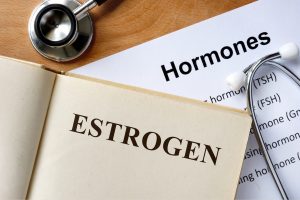Hair loss in menopause
Menopause is a natural biological process that affects all women and which typically occurs between the ages of 45 and 55.
During menopause, the body goes through numerous physical changes as it adjusts to fluctuating hormone levels. The most common, and most talked about symptoms, are hot flashes, mood swings, night sweats, weight gain, lack of energy and insomnia.
Unfortunately though, about 40% of women going through menopause also experience hair loss, which manifests itself in the form of an overall thinning on the frontal hair line and/or in the crown area.
Hormones and Hair loss
Hair loss during menopause is caused by an hormonal imbalance, specifically related to a natural decline of estrogen and progesterone levels which all women start experiencing in there mid-thirties. These hormonal changes may not be visible for years, but when they affect someone who already has a genetic sensitivity to dihydrotestosterone (DHT), hair loss quickly becomes more apparent. Another hormone shift that happens for women later in life, can be an increase in the production of androgens, or a group of male hormones, which additionally impact hair follicles by causing them to shrink.
Other causes of hair loss during menopause
Although the main cause of hair loss in women going through menopause is related to hormonal changes, other factors, such as high levels of stress, poor nutrition, illness, poor hydration and also insomnia, can also play an important role in the well being of your hair.
You may not know this but stress can very much affect estrogen production, causing an imbalance that affects brain chemistry, which in turn triggers mood swings, anxiety, and depression.
Keeping stress levels under control is important as stress can directly affect a person’s ability to absorb nutrients, as well as increasing the body’s nutritional requirements.
Vitamins and minerals have a crucial role in hair health
Vitamins and minerals such as Choline, Biotin, Vitamin D3 and Iron, as well as Essential Fatty Acids such as Borage, Evening Primrose, Flax and Fish oils play a crucial role in maintaining hair health and stimulating hair growth. If these nutrients are not being absorbed correctly by the body, or are not being introduced through a balanced diet, hair loss will be a natural consequence.
Problems also arise in the case of women going through menopause, may also be taking prescription medications in order to deal with issues such as:
- thyroid imbalances,
- vitamin deficiencies,
- poor scalp conditions.
Hair loss may very likely be one of the side affect of medications treating these, or other types of problems, so if you find yourself experiencing serious hair loss, ask your doctor if this may be the case of your therapy.
What can you do for hair loss in menopause
Hair loss during menopause can be tackled through a series of actions, firstly, keep stress under control by finding an activity that suits your needs in terms of stress relief. This can be anything from yoga or other breathing relaxation techniques, to regular sport activities such as swimming or walking, to simply reading or listening to music.
Stay hydrated and maintain a regular sleeping pattern, and finally, you could help boost your hair growth through the use of certain products.
DHT Blockers for example could help protect the hair follicles and slow down the process of hair thinning by decreasing the impact of DHT on the scalp.
Also, the use of creams, shampoos or supplements which contain vitamins, minerals and fatty acids, will ensure your hair is receiving all the necessary nutrients it needs to grow and stay healthy.


